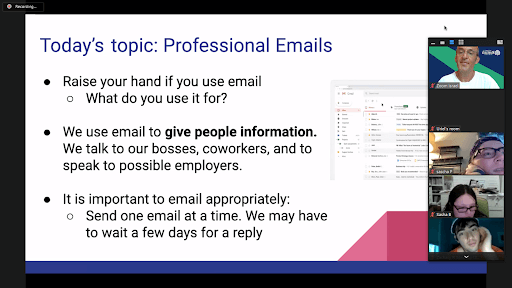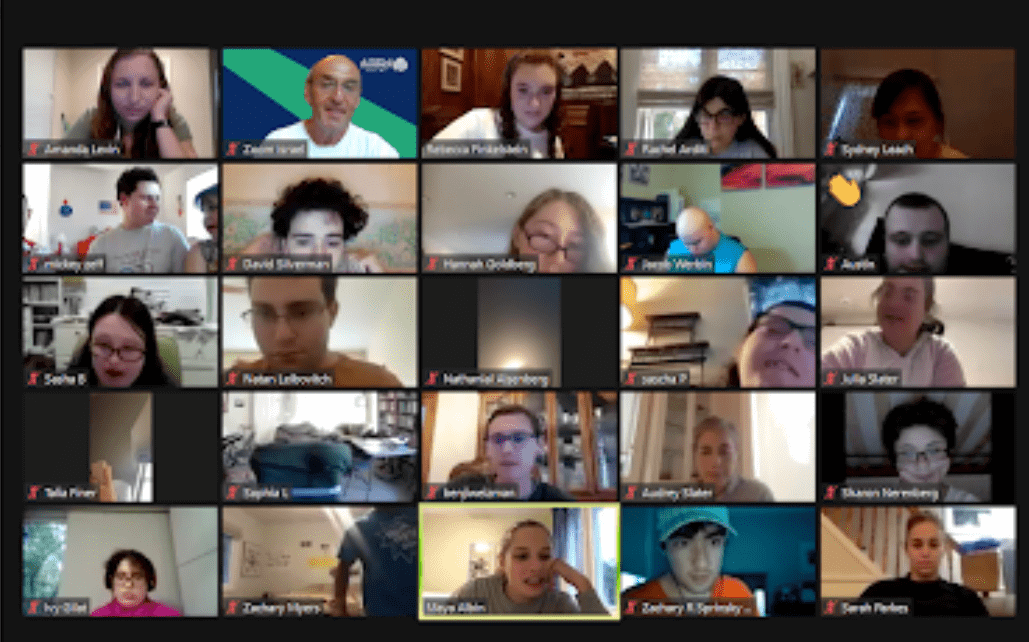It is a job to celebrate with 3 families in two weeks–all close on the Jewish Calendar to the holiday of Purim. Two will be on Shabbat in synagogues with the appropriate precautions (masks, distancing, aliyahs from behind plexiglas, limits on numbers of guests, “to go” kiddush boxes); one will be family only in a home with me and Zoom-producer in person and with masks–and in costumes for Purim megillah reading.
Two Men and a Shredder: Starting a Business During COVID-19
Uriel Levitt and Jacob Werbin, the company’s co-founders, are best friends. They live in Washington and enjoy their summers together in the Tikvah Program at Camp Ramah in New England.
‘On Mondays We Eat Local’ Aids NY Kosher Eateries
Original Post Published On The Jerusalem Post
Henry Simchi, the longtime manager of Kasbah Grill on West 85th Street, reports, “I didn’t know how to say thank you! We were struggling, and this income helps keep us going.”
When Manhattan 20-something Jonah Rosen went to pick up a food order from a local Upper West Side kosher restaurant, he was shocked and jolted to action.
“I saw the owner sitting by himself, and I was the only order of the night,” reports Rosen.
He was aware of how the Covid pandemic was affecting local restaurants, but now the problem hit close to home. “When you see an owner sitting in the dark, it tugs at you. You think of a person with a family. This is a ‘people are suffering’ issue.”
Rosen discussed his observations with his roommate, and the two brainstormed ways they and local residents might help. This is how “On Mondays We Eat Local” was born.
Rosen, a loyalty team member for JetBlue airline and roommate Eli Nussbaum, a physician’s assistant, decided to approach one local kosher restaurant each week and organize friends and other local residents to order food from that restaurant, each Monday. There was no risk to the restaurants, no guarantees of extra business, and no cut taken by Rosen or Nussbaum.
They encouraged patrons to order directly from the restaurants and not through an online food ordering and delivery platform. This would maximize profits for the establishments.
Restaurant owners would agree to offer “something special” to customers that night, ranging from a 10% discount, to a free menu item. Rosen and Nussbaum – and the local community – do the rest.
Early in the week, the organizers approach a restaurant, targeting those Rosen describes as “disproportionately affected.” He works out the “special offer” with the manager and, by Sunday, posts online, sends emails to friends and such community partners as Bnei Akiva, and makes a final big push on Monday.
So far, five restaurants, including Talia’s Steakhouse and Bar, and Modern Bread and Bagel, have benefited from the initiative. And customers and restaurant owners are generally very pleased.
Henry Simchi, the longtime manager of Kasbah Grill on West 85th Street, reports, “I didn’t know how to say thank you! We were struggling, and this income helps keep us going.”
New York City restaurants have been closed for months for dining in, and will soon open at 25% capacity. Simchi worked with Rosen to come up with a special offer where orders over $22 would come with six free sesame wings and fries. “We filled 33 orders in one day, where we were usually doing 10 or 12! It meant an extra $1,000!”
This week, the project expanded to Midtown Manhattan, where Taam Tov (West 47th Street) was pleased with the 40-plus orders it received through the “Eat Local” project.
“We were super happy. The proving is moving onwards and upwards!” reports Rosen.
Despite the lack of risk and relative simplicity of the program for restaurant owners, Rosen has found that some restaurants have either said they are not interested or have not returned his calls.
While most of the 21 comments in response to an article about the initiative in the West Side Rag (“News About the Upper West Side of NYC”) were very positive (Leigh: “What a great way to inspire support of the neighborhood!! Great work!” Shoshi: “Such mensches!”), some feel the project is “discriminatory” and should support more than just kosher restaurants.
Rosen is not discouraged. He hopes people will learn of the project and replicate it. “When people in other communities and cities read about it, they should say, ‘This is not complicated. I can do this!’”
Rosen even envisions a potential post-pandemic life for the initiative. “Perhaps roommates [he lives with three others in the West 90s] will set aside one night a week to dine together – by delivery or by cooking together.”
What It Means To Be Essential – During Covid And Beyond
Original Post Published On Foundation for the Jewish Camp
While doctors, lawyers, investment bankers, and so many others were working from home and not always feeling very “essential” during the pandemic, Austin, Tiffany, and other people with disabilities were teaching what it means to be and feel truly essential.
When the pandemic hit and it became clear that camp would not take place this summer in the same way it had in previous summers, Ramah campers across North America were deeply disappointed. In the months leading up to summer, campers with and without disabilities enjoyed dozens of quality programs offered by each individual camp and by National Ramah. Even with the availability of these programs, current members of our vocational training programs and alumni—many who found themselves out of work or no longer at in-person internships—expressed concerns that without a summer at camp, they would lose the opportunity to work on important vocational and social skills. We quickly mobilized to create TikvahNet, a series of 75-minute Zoom meetings facilitated by Ramah Tikvah staff, focusing on both job skills and socialization.

We recently kicked off our third 8-week series of TikvahNet programming. To date, over 80 current or former Tikvah voc ed program members have participated. For each session, the program coordinator and four staff members prepare PowerPoint slides, enabling participants with a wide range of intellectual and developmental disabilities and verbal abilities to fully participate in the program. Slides were shared with participants and families prior to each session so they could prepare in advance. We have learned about money management, workplace behavior, the elections and our right to vote, proper precautions to take during the pandemic, resumes, and self-advocacy. We have also cooked, danced, enjoyed a virtual tour of Israel and a Chanukah party, and made cards of appreciation to frontline workers. The level of dedication of the staff members truly led to the success of the program. They developed, individualized, and expanded the concept of TikvahNet so that it will continue even beyond the pandemic.
One of the great benefits of TikvahNet has been watching participants from Toronto socializing with old and new friends from Chicago, Seattle, Washington, Miami, and Los Angeles—across three time zones! Participants enjoy sharing stories of one very special thing they have in common—camp! They compare notes on similarities and differences between camps–special Shabbat foods, whether they have a pool or a lake, and where they pray on Shabbat. They look forward to ending each session with the Ramah-wide nighttime song, Rad Hayom.
Perhaps most inspiring has been listening to Austin and Tiffany tell the group about their jobs. Austin spoke about his job at a hospital in St. Louis, where he delivers food trays to patients in their rooms. “I am an essential worker!” he tells the group. Tiffany of Los Angeles adds, “I’m an essential worker, too! I work in a grocery store.” Austin and Tiffany are performing essential work and more importantly, are feeling like the essential workers that they are.
We hope to continue helping people with disabilities feel more essential and ultimately find meaningful employment. In the current phase of TikvahNet, we are inviting businesses who employ people with disabilities to describe what it takes to be hired by their companies. We have already heard from Blue Star Recyclers (computer and electronic recycling), and will soon hear from Luv Michael, a granola company. Two current TikahNet participants and their parents will soon join to share the story of Shred Support, the DC-area shredding company they started during the pandemic. These two young men with Down Syndrome, Uriel and Jacob, are doing essential work and teaching the community what it feels like to be essential.



